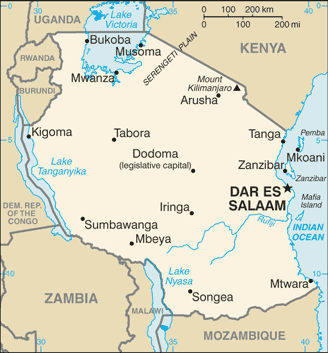
Suffering Grass: A Tanzanian Perspective
Edith Mpangala, Peace Corps Medical Officer (PCMO) and native Tanzanian, speaks with obvious affection for her American volunteers when she says to me in her friendly drawl, “My dear, I feel great that I have friends like you people, and I feel strongly you are like one of my own children.” On the day of the bombings, August 7, 1998, Edith was in a building adjacent to the embassy in Dar es Salaam, Tanzania, examining a volunteer with a high-fever. Suddenly, a blast, initiated by a suicide bomber in a large truck, shook her office and she recalls the sickening feeling as she experienced when she heard the shattering glass nearby.
In the moment of the explosion’s impact, she flashed back to her experiences as a nurse stationed on the front-line during the war between Tanzania and Uganda where she was nearly killed several times by Ugandan bombs blasting towards the army asleep in the trenches. Immediately, she knew this was an explosion and quickly called Aga Khan Hospital, where the receptionist reported that the U.S. Embassy had indeed been bombed. Other Peace Corps workers would not accept this news. The Peace Corp’s Country Director (CD), whose wife worked at the embassy yelled angrily, “Edith, stop this rumor, the embassy has not been bombed.” Quickly, she grabbed her medical kit. Meanwhile, at the scene of the bombings, Tanzanian ministers and police, and American security prevented anyone from entering the building, fearing another explosion. Edith and her fellow PCMO rushed through backstreets and neighborhoods, climbed wire fences, and scaled the embassy wall to reach the injured. She worked all night in nearby Muhimbili National Hospital to tend to the wounded and coordinate care for families. She found herself in the wards, briefly, alongside the CD’s wife. She remembers at one point consoling an American lady who had lost her Tanzanian husband. His body was unrecognizable, identified only by the trousers and belt he had worn to work that day.
In the weeks and months after the bombing, Edith received calls from concerned friends and relatives in Dar es Salaam who were distraught that a violent act like this could take place in their homeland. Edith revealed her disappointment after reading a state department cable that praised the "quick actions" of American staff who had not contributed much to the relief and that overlooked the efforts of herself and her Tanzanian counterparts. “I was surprised with the American system. My country was shaken up because we have no experience with violence. For a couple of years after, I was afraid of terrorism and to tell people that I was working with an American organization.”
Edith now believes that the bombings have resulted in improved political, economic, and social relations between Tanzania and the U.S. and that safety and security has improved, stating, “Terrorism was an eye opener to Tanzania. We (the U.S. and Tanzania) have to be on the same page fighting terrorists, because no single American died in the attacks. It was the Tanzanians who died. Tanzania has and will continue to improve security.” To bolster security, she hopes the U.S. will develop exchange programs with Tanzanian police and army to increase their training and security techniques.
In addition, she suggests that Tanzania should remain rigid in its policy that keeps religion and government separate. In Tanzania, mutual respect exists between Christians and Muslims who work side by side in their fields, schools, and government. Edith further recommends that peace-making Muslim and Christian leaders should be encouraged to work together. She finds hope in the growing emphasis placed on religious teachings of peace and love in both religions. The key, according to Edith, will be to minimize clashes between the United States and the Muslim world in order to reduce terrorism around the globe.
Now almost 12 years since the bombing, and after 26 years of working with United States Peace Corps, Edith Mpangala has been asked to retire by the Washington Office so that they may replace her nursing position with that of a medical doctor. She longs to visit her friends in America and shares her hope that the violent influence of terrorism will stay far away from Tanzania. Because as she concludes, “Fahari wawili wakigombana ziumiazo ni nyika.” When two herds fight, it is the grass that suffers. [1]
[1] Excerpts from email interview with Edith Mpangala February 23, 2010. I wrote this as an extra portion of my paper, “Tanzania and Islamic Radicalization” in Terrorism, Crime, and Public Policy
No comments:
Post a Comment